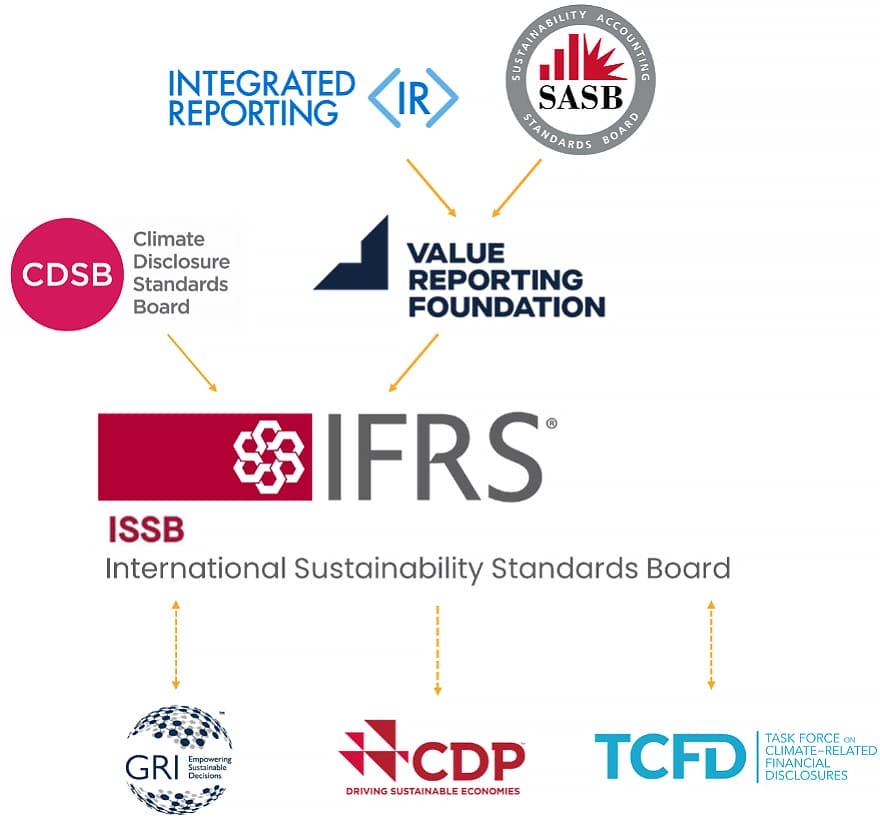The New Era of Sustainability Reporting: Global Landscape and Practical Lessons
Emmanuelle Palikuca
ESG Reporting Landscape
The ESG reporting landscape is undergoing rapid transformation, with regulatory shifts, evolving standards, and new stakeholder expectations driving both opportunities and challenges for organizations worldwide.
The demand for consistent, comparable, and decision-useful sustainability information remains strong, driving voluntary standards toward greater harmonization and jurisdictions toward stronger mandatory frameworks.
Global Snapshot
United States
- Shift from voluntary to mandatory: While the previously adopted SEC climate disclosure rule has halted, regulations at the state level continue moving toward mandatory disclosures for climate-related risks and greenhouse gas (GHG) emissions with reporting in California beginning in January 2026.
- State-by-state action: In California, SB 253 and SB 261 mandate Scope 1, 2, and (over time) 3 GHG reporting, plus climate risk disclosure for companies with annual revenues in the state exceeding a set amount. Other states, including New York, New Jersey, Illinois, Washington, Colorado are following California’s lead by introducing similar climate-related active or pending legislation, with varied revenue thresholds and reporting timelines.
Practical focus for companies: Companies increasingly align with the ISSB and TCFD frameworks for climate and risk disclosures. Investor language is moving away from “ESG” toward “material sustainability risks and opportunities.
Canada
- Regulatory pause: Canadian Securities Administrators (CSA) have delayed implementing new mandatory climate-related disclosure rules as of April 2025, due to market uncertainty.
- ISSB-aligned standards: The Canadian Sustainability Standards Board (CSSB) released voluntary standards (CSDS 2, December 2024) with expectation of future mandatory adoption.
Practical focus for companies: Use the current “pause” to prepare, perform dry runs, and plan for rapid regulatory return. Reporting remains critical for market access and investor confidence.
European Union (EU)
- CSRD & ESRS changes: The Corporate Sustainability Reporting Directive (CSRD) expands detailed sustainability reporting—now being streamlined:
- Omnibus Package (2025): Raises company size thresholds, reduces scope by up to 80%.
- Timeline extended: Reporting delayed by two years for many, but “Wave 1” filers already issued first reports.
- Trends in reports: Key findings from preliminary reports published show that Reports vary widely in length and style but follow a relatively consistent ESRS-based structure, with comparability strong at a high level but weak at the datapoint level. Most companies focus on a few core topical standards—climate change, workforce, and governance—while rarely reporting on less material sub-topics.
Practical focus for companies: Early lessons encourage targeted materiality, through double materiality assessments, and robust stakeholder engagement with investors and across the entire value chain.
Other Notable Jurisdictions
New Zealand
Mandatory climate disclosure: Under the Financial Sector (Climate-related Disclosures and Other Matters) Amendment Act 2021, listed issuers, large banks, insurers, and investment managers must disclose climate risks and opportunities in annual reports. Based on the NZ CS 1, CS 2, and CS 3 standards, which are closely aligned with TCFD and moving toward ISSB alignment, the purpose is to support capital allocation to low-emissions, climate-resilient activities and attract climate-aware global investors. 2024 marked the first year of reporting by issuers, but the External Reporting Board (XRB) is consulting on further timeline extensions for Scope 3 and financial impact disclosures.
Australia
AASB S2 incoming: The Australian Accounting Standards Board will require listed and large companies to disclose climate-related financial risks and GHG emissions (Scope 1, 2, and regulated Scope 3). The final AASB S2 standard is planned for application starting in 2026, following ISSB/TCFD structure.
Hong Kong
IFRS S1/S2 adoption: The HKEX (Hong Kong Exchanges and Clearing Limited) is set to adopt IFRS S2 for climate-related disclosures from January 2026. Listed entities must report on governance, strategy, risk management, metrics, and targets in line with international climate standards.
Mexico
Sustainability reporting development: As of 2025, the regulatory framework incorporates ISSB-based requirements and GHG emission disclosures for large entities and public companies. Mexico is developing these sustainability standards to increase international consistency, transparency, and market attractiveness.
Voluntary Standards and Framework Consolidation
The voluntary reporting space is also evolving, primarily under the purview of the International Sustainability Standards Board (ISSB). ISSB, under the IFRS Foundation, now provides a unified baseline, with widespread adoption supported by technical mapping and collaboration across standard setters.
Multiple frameworks, including SASB, CDSB, TCFD, and GRI are either consolidating under ISSB or collaborating with the organization to standardize reporting, promote interoperability of standards, and create a harmonized global approach. Industry initiatives, such as partnerships between the GHG Protocol and ISO, further demonstrate momentum toward simplified and streamlined emissions accounting, benefiting companies seeking efficiency and comparability across jurisdictions.

Key Trends and Reporting Strategies
With this evolving reporting landscape, organizations should consider several key trends when developing or adjusting their sustainability reporting approach:
- The need for quality data, strong governance, and clear materiality prioritization
- A growing shift in narrative, away from broad ESG terminology to focused discussions of specific material sustainability risks and opportunities
- A growing emphasis on making intentional, well-substantiated commitments and disclosures to enhance transparency, avoid greenwashing, and build stakeholder trust amid increased regulatory scrutiny in Canada and beyond
- Rising demand for machine-readable, structured, concise, and impactful sustainability reports, less check the-box, more targeted narratives plus infographics and clear metrics
Building Your Sustainability Reporting Approach
Understand Expectations or Requirements: With so many evolving standards, frameworks, and regulations, it can be challenging to know what to report, or what constitutes best practice. Companies should dedicate time upfront to identify required disclosures and determine internal goals for reporting, such as defining the target audience, purpose, and communication priorities. Clarity at this stage provides efficiency later, ensures compliance with mandatory requirements, and helps position the report as a meaningful tool rather than a compliance-only exercise.
Build Strong Engagement and Collaboration: It’s critical to understand the needs of stakeholders in order to address them. Effective sustainability reporting hinges on broad engagement across the organization and with external stakeholders. Engaging with your shareholders year-round, not just ahead of the annual meeting, is a meaningful way to gauge their priorities and expectations. The same goes for other external stakeholders, such as customers, who are increasingly seeking information around companies’ environmental and social practices. Internally, engaging cross-functional teams (finance, operations, HR, procurement) is paramount to successful and effective reporting.
Position Sustainability Reporting as Strategic Communication: Finally, while there are reporting regulations evolving globally and there is an element of compliance that has been introduced into reporting, companies should not let this alone drive their reporting approach. Investors, especially shareholders, want to see how sustainability aligns with overall corporate strategy and growth. Sustainability reporting should address key points around risk, opportunity, and long-term value creation. Just checking the box on reporting is not an effective use of your company’s time and is not effective in addressing the needs of stakeholders—use reporting as an opportunity to tell your company’s story.
Streamline Your Reporting with
Whether reporting is mandatory or voluntary, clear, intentional sustainability disclosures drive value creation, strengthen stakeholder trust, and position organizations for long-term success.
Alliance Advisors provides tailored, year-round support to enable companies to strengthen and streamline their sustainability reporting and communication. With Invictus Align, backed by our expert advisory support, companies are able to:
- Map regulatory requirements across all jurisdictions of operation to identify relevant disclosure topics
- Create audit-ready systems of record that ensure transparency, data integrity, and preparedness for internal and external assurance.
- Manage workflows and disclosure deadlines by assigning clear data and reporting responsibilities across teams.
- Facilitate cross-functional collaboration by centralizing reporting activities into a single platform, connecting finance, sustainability, operations, legal, and other teams for seamless engagement.
- Emphasize strategic communication of material risks, focused transparency, and credible disclosures to address investor expectations and avoid pitfalls such as greenwashing.
Start today to prepare for evolving regulatory requirements and investor expectations, ensuring your sustainability story is clear, credible, and effectively drives long-term value for your business and stakeholders.





